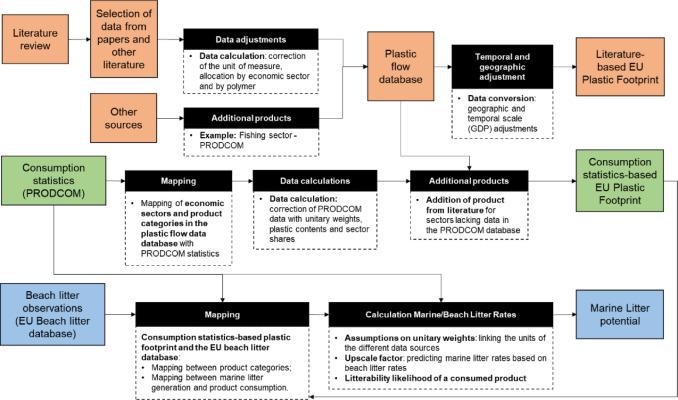The research by scientists in Italy combined various approaches including production and consumption flows as well as estimating marine littering potentials.
Plastic is one of the most abundant materials on the planet and is used in almost all facets of daily life, however, general information about the plastic flows in value chains is relatively lacking.
“The review highlights the lack of complete and homogeneous estimates of EU plastic production and consumption, as well as detailed figures for specific sectors (e.g., fishing, healthcare, electrical and electronic equipment),” explains corresponding author Serenella Sala of the European Commission’s Joint Research Centre, Italy.
Plastic Problem
Global plastic production totaled 368 million metric tons in 2019 and while it is estimated that there has been a decrease of around 0.3% as a result of the impact Covid-19 has caused, projections are that use and production will continue to grow in the future.
The growth is anticipated by the fact that plastics are extremely adaptable for a wide range of tasks and applications but because they mostly derive from fossil-based sources extraction and production of fossil fuels has environmental impacts.
Furthermore, consumption trends are seeing increased use of single-use plastics that cause ecological issues as they are usually just discarded and then they break down and release toxic chemicals into the environment.
Additionally, marine litter and microplastic releases into the world’s oceans are raising concerns as plastics negatively impact aquatic, marine life while also entering the food chain and potentially affecting human health.
The Importance of Monitoring Plastic
Therefore, it goes without saying that there is significant importance on carefully monitoring plastic production and consumption, especially in terms of region, as it can help support future research and also help in the assessment of the environmental impact of plastic.
The study delivered by Sala and her colleagues showed that three polymers, in particular, dominated the plastic flows. These were low-density polyethylene (LDPE), polypropylene (PP), and polyethylene terephthalate (PET).
These plastics are typically used in the production of single-use plastic bags, food containers, and water bottles and make up much of the environmental pollution, in particular marine litter. However, the model the researchers propose in their study could help fill in key gaps in the knowledge and generate the data needed to help tackle the ever-growing plastic pollution issue.

The methodological approach of the study. Image Credit: Andrea A et al., Resources, Conservation and Recycling
Monitoring is key to assessing the efficacy of measures implemented to reduce the abundance of plastic debris, but it is made all the more complicated by large spatial and temporal heterogeneity in the amounts of plastic debris and a limited understanding of the pathways followed by plastic pollution and its long-term fate.
Interpreting Litter Rates Per Person
“Concerning the marine litter potential, beach litter rates -based on EU beach litter observations and plastic statistics- were in the order of 10000 part per million of the consumed plastic,” says Sala.
In addition to beach litter rates, the study also details other sources and references of plastic products such as microplastic releases from rubber tires, the team combined a literature-based approach with a consumption statistics-based approach to generate figures for the plastic footprint per person in the EU.
The team estimated that EU citizens have a plastic footprint between 84 kg and 129 kg per capita per year. The researchers call for a harmonization of the plastic data as it may facilitate the creation of new frameworks that could accurately model plastic consumption with the aim to drive down plastic pollution.
“The need of investigating further the footprint of EU plastic consumption is a fundamental step in view of fulfilling EU ambition in assessing the environmental impacts of plastics,” Sala stated.
Currently, charges and/or bans on plastic bags in various EU countries have driven down usage of these products, other rules such as the ban of plastic in certain products such as cutlery, straws, and drink stirrers are being rolled out across the continent to effectively combat marine litter.
Developing new strategies and policies in the future is dependent on accurate data and studies as tools for providing detailed information for quantifying and monitoring plastic pollution and marine litter.
Since the European Commission previously introduced new rules to reduce marine litter in 2018, the present study could statistically enhance the effectiveness of the rules and regulations previously developed as well as helping usher in new policies to combat the environmental impact of plastic.
References and Further Reading:
Andrea Martino Amadei, Esther Sanyé-Mengual, Serenella Sala,“Modeling the EU plastic footprint: Exploring data sources and littering potential,” Resources, Conservation and Recycling, Volume 178. 2022. https://www.sciencedirect.com/science/article/pii/S0921344921006947?via%3Dihub
Ryan, Peter G et al. “Monitoring the abundance of plastic debris in the marine environment.” Philosophical transactions of the Royal Society of London. Series B, Biological sciences vol. 364,1526 (2009): 1999-2012. https://royalsocietypublishing.org/doi/10.1098/rstb.2008.0207
European Commission Press Release: “Single Use Plastics: New EU Rules to Reduce Marine Litter” [https://ec.europa.eu/commission/presscorner/detail/en/IP_18_3927
Disclaimer: The views expressed here are those of the author expressed in their private capacity and do not necessarily represent the views of AZoM.com Limited T/A AZoNetwork the owner and operator of this website. This disclaimer forms part of the Terms and conditions of use of this website.